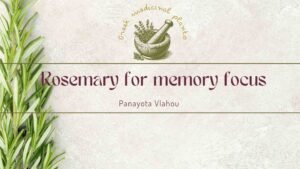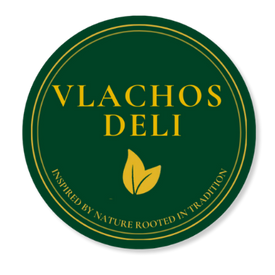Rosemary for Remembrance With Tincture Recipe, Ancient Myths & Historical Botanists' Wisdom
From Ancient Greece to modern laboratories, rosemary’s reputation as the herb of remembrance has persisted through time. Traditionally used to honor memory at weddings, funerals, and exams, rosemary is now known to offer real cognitive support, as science continues to catch up with folklore.
But rosemary is more than an aromatic sprig—it’s a medicinal herb, a sacred symbol, and a tool for mental clarity. This article explores rosemary’s memory-enhancing benefits, a DIY tincture recipe, ancient lore, and the wisdom of famous botanists who revered this timeless plant.
Rosemary in Myth and Memory
-Ancient & Medieval Symbolism:
-
"In Ancient Greece, rosemary was considered a sacred herb, often associated with memory and fidelity. While not directly tied to Aphrodite in classical mythology, later traditions romantically linked the fragrant plant to the goddess of love, symbolizing beauty and vitality.".
- During the Middle Ages, it was believed that planting rosemary near your door kept evil spirits and nightmares away. It was hung in homes to ward off the plague.
-The Myth: A Youth Restored by Rosemary
As legend has it, Queen Elizabeth—by then aged 72 and afflicted with gout or paralysis—was gifted a rosemary-based formula (Hungary Water) by a hermit or alchemist. After using the herbal tonic, she allegedly regained such youth and vitality that the King of Poland proposed marriage, despite her advanced age.
Hungary Water (Aqua Reginae Hungariae) is believed to have originated in the 14th century and was primarily made by distilling fresh rosemary in alcohol. Later versions included other botanicals such as lavender, thyme, and mint, but rosemary remained the star ingredient.
This tale, though romanticized and likely apocryphal, helped catapult Hungary Water into fame. It was widely used throughout Europe for centuries and considered a staple in early pharmacology and perfumery.
-Shakespeare & Literature:
-
In Hamlet, Ophelia famously declares, “There’s rosemary, that’s for remembrance.”
-
It was worn at weddings for fidelity and placed on coffins for everlasting remembrance of loved ones.
Scientific Evidence: Does Rosemary Really Improve Memory?
Yes—and here’s the research to back it up:
1. Aromatherapy Boost
A study found that participants exposed to rosemary essential oil performed better on memory and speed tasks (Moss et al.).
2. Active Compounds
Carnosic acid, a potent antioxidant found in rosemary, has been shown to protect brain cells from degeneration and oxidative stress (Scripps Research, 2025).
3. Oral Ingestion
A clinical trial on elderly participants using rosemary powder (at 750 mg) showed improved memory speed and alertness (pubmed).
How to Make your own Rosemary Tincture
A tincture is a concentrated herbal extract made with alcohol. It's ideal for long-term use and easy daily dosing.
Ingredients:
-
1 cup fresh or dried rosemary leaves
-
2 cups 80–100 proof vodka or brandy
-
Clean glass jar with tight lid
-
Cheesecloth or fine mesh strainer
-
Dropper bottle for storage
Instructions:
-
Lightly crush rosemary leaves to release oils.
-
Place them in the jar and cover fully with alcohol.
-
Seal and shake well. Store in a cool, dark place for 4–6 weeks, shaking daily.
-
After infusion, strain out the herb and transfer liquid into a dropper bottle.
-
Store in a dark cabinet. Shelf life: up to 2 years.
How to Use:
-
Take 10–30 drops (½ to 1 tsp) diluted in water or tea, 1–2 times per day.
-
Use consistently over several weeks for cognitive benefits.
Note: Consult a herbalist or healthcare provider before internal use, especially if pregnant or on medication.
How Famous Botanists used Rosemary?
Dioscorides (1st Century CE)
The Greek physician and author of De Materia Medica praised rosemary for “warming the brain” and stimulating mental clarity. It was used to treat “head coldness” and melancholy.
Nicholas Culpeper (1616–1654)
The English botanist and astrologer described rosemary as a “sovereign herb for the brain”, enhancing memory, curing palsy, and “quickening the senses.” He associated rosemary with the Sun and the sign Leo, suggesting it strengthens the heart and spirit.
"It helps a weak memory, and quickens the senses." – Culpeper's Complete Herbal
Modern Everyday Tips to Use Rosemary for Memory
1. Aromatherapy
Diffuse rosemary essential oil in your workspace or inhale directly before mental tasks.
2. Tea or Infusion
Steep 1 tsp dried rosemary in hot water for 5–10 minutes. Drink daily to stimulate circulation and alertness.
3. Topical Use
Dilute rosemary oil in a carrier oil and apply to temples or scalp. Improves blood flow and may reduce fatigue.
4. Tincture Routine
Add 1 dropper of rosemary tincture to water or juice each morning. Keep it next to your coffee or tea to build a habit.
Precautions
-
Avoid high doses if pregnant or breastfeeding.
-
Do not ingest essential oils directly.
-
May cause skin irritation—do a patch test first.
-
Consult a doctor if on medication or with existing health conditions.
Final Thoughts
Rosemary is remembrance—not only in lore, but in biochemistry. It blends the wisdom of ancient rituals with the precision of modern neuroscience. Whether you sip it, smell it, or turn it into tincture, this Mediterranean herb stands as a fragrant ally for memory and mental clarity.
Scientific References
-
Moss, M., Cook, J., Wesnes, K., & Duckett, P. (2012). Aromas of rosemary essential oil improve memory and mood. PubMed
-
Panahi, Y., et al. (2015). Rosemary oil vs. minoxidil: hair growth study. PMC
-
Scripps Research Institute (2025). Carnosic acid protects neurons. Scripps.edu
-
Culpeper, N. Complete Herbal. (1653). Available via archive.org


